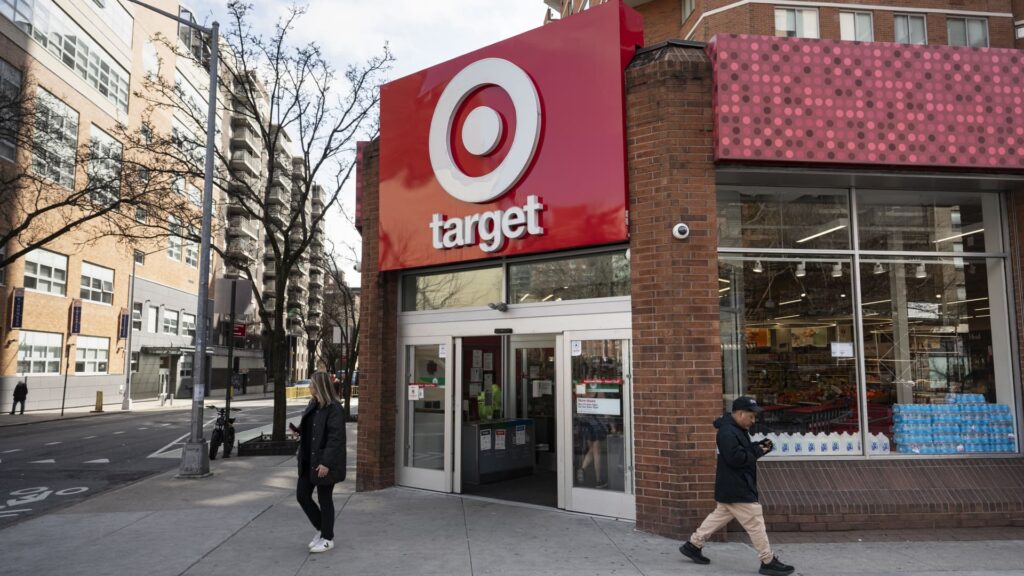
Target CEO Brian Cornell Meets With Al Sharpton Following DEI Rollback and Boycott Threats
Target DEI Rollback: CEO Brian Cornell Meets Al Sharpton Amid Boycott Threats
Target CEO Brian Cornell (center) meets with the Rev. Al Sharpton (right) in New York on April 17, 2025. (Photo: National Action Network)
Table of Contents
- Target DEI Rollback: An Overview of the Controversy
- Cornell-Sharpton Meeting: High-Stakes Discussion Following DEI Cuts
- Boycott Threats and Traffic Decline: The Business Impact
- Target’s DEI Rollback: What Changed and Why
- Corporate America’s DEI Retreat: The Broader Context
- Costco’s Contrast: Standing Firm on DEI While Target Retreats
- Sharpton’s Demands: Expectations for Target’s DEI Commitments
- Cornell’s Previous DEI Stance: Target’s Post-Floyd Commitments
- Future Implications: What’s Next for Target’s DEI Strategy
The Target DEI rollback crisis escalated on Thursday as Target CEO Brian Cornell met with civil rights leader Rev. Al Sharpton in New York, addressing growing concerns over the retailer’s controversial decision to scale back its diversity, equity, and inclusion programs. This high-profile meeting, requested by Target itself, comes as the company faces mounting pressure, boycott threats, and a documented 10-week decline in store traffic following its January announcement to curtail DEI initiatives.
The Target DEI rollback has become a pivotal case study in how corporate America is navigating diversity commitments in a politically charged environment. Sharpton described the meeting as “constructive and candid,” though he has not yet decided whether his National Action Network will formally join calls for a boycott of the retailer, a decision that could significantly impact Target’s already declining customer base.
Target DEI Rollback: An Overview of the Controversy
In January 2025, Target announced a significant rollback of its DEI programs, ending its three-year diversity goals, discontinuing participation in external diversity benchmarks like the Human Rights Campaign’s Corporate Equity Index, and halting specific initiatives to increase shelf space for products from minority-owned businesses. This dramatic reversal from the retailer’s previous stance has triggered substantial backlash from civil rights organizations and consumers alike.
The Target DEI rollback represents one of the most visible examples of a growing trend among major American corporations retreating from diversity commitments made during the racial justice movement that followed George Floyd’s murder in 2020. Target’s decision is particularly notable given that Minneapolis, where Floyd was killed, is the company’s hometown, and CEO Brian Cornell had previously expressed a strong personal connection to the tragedy.
Key Aspects of Target’s DEI Rollback
- Termination of three-year diversity, equity, and inclusion goals
- Discontinuation of reporting to external diversity benchmarking organizations
- Ending of specific programs supporting Black and minority-owned businesses
- Shift away from public diversity commitments made following George Floyd’s murder
- Policy changes announced in January 2025, coinciding with political climate shifts
Cornell-Sharpton Meeting: High-Stakes Discussion Following DEI Cuts
The meeting between Target CEO Brian Cornell and Al Sharpton was initiated by Target, indicating the company’s recognition of the serious repercussions of its DEI rollback. Sharpton had previously expressed willingness to hear Cornell’s explanation before deciding whether to call for a formal boycott, stating: “If [Cornell] wants to have a candid meeting, we’ll meet. I want to first hear what he has to say.”
The civil rights leader’s National Action Network (NAN) announced that Sharpton would be consulting with the organization’s board of directors over the Easter holiday “to determine any next steps with Target” and other companies that have scaled back their DEI commitments. The outcome of these deliberations could significantly impact Target’s public image and customer base in the coming months.

People walk past a Target Store in Midtown Manhattan on March 6, 2025 in New York City, as the retailer faces backlash over its DEI policy changes. (Photo: Mostafa Bassim/Anadolu/Getty Images)
Boycott Threats and Traffic Decline: The Business Impact
The business impact of Target’s DEI rollback has been immediate and measurable. Following the January announcement, the company has experienced a significant decline in customer foot traffic. According to analytics firm Placer.ai, which uses anonymized data from mobile devices to estimate store visits, Target’s foot traffic has declined for 10 consecutive weeks compared to the same period last year.
This consistent decline began the week of January 27, directly coinciding with Target’s DEI rollback announcement. Prior to this controversial policy change, the retailer had been experiencing year-over-year increases in store visits, highlighting the direct correlation between the diversity policy changes and customer behavior.
Target’s Business Metrics Following DEI Rollback
| Metric | Performance |
|---|---|
| Foot Traffic | 10 consecutive weeks of year-over-year decline |
| March 2025 Traffic Change | -6.5% year-over-year |
| Traffic Trend Before DEI Rollback | Positive year-over-year growth |
| Timing of Decline | Beginning week of January 27, 2025 |
While foot traffic data does not directly translate to sales figures (as it doesn’t capture online purchases or the value of in-store transactions), it provides a strong indication of consumer sentiment toward the brand following its DEI program cuts. Target declined to comment on these figures, stating that it doesn’t discuss third-party data.
Target’s DEI Rollback: What Changed and Why
The Target DEI rollback represented a dramatic shift from the company’s previous commitment to diversity initiatives. In January 2025, Target announced several significant changes, including:
- Ending its three-year DEI goals that had previously been public commitments
- No longer sharing company diversity reports with external organizations like the Human Rights Campaign
- Discontinuing specific efforts to increase shelf space for products from Black- and minority-owned businesses
- Shifting away from public diversity commitments that had been central to its corporate messaging
These changes marked a stark reversal from Target’s earlier stance, particularly following its commitments after the murder of George Floyd in Minneapolis, the retailer’s hometown. The decision appears to have been influenced by growing pressure from conservative activists and concerns about potential political backlash in the post-2024 election environment.
Timeline of Target’s DEI Evolution
| Period | DEI Approach |
|---|---|
| Pre-2020 | Standard corporate diversity initiatives |
| Post-Floyd (2020-2024) | Enhanced commitments to racial equity, supplier diversity, and internal representation goals |
| January 2025 | Announcement of DEI rollbacks, ending specific programs and external reporting |
| Jan-Apr 2025 | Facing boycott threats and declining store traffic following DEI policy changes |
| April 17, 2025 | CEO Brian Cornell meets with Al Sharpton to address concerns about DEI rollback |
Analysts suggest that Target’s DEI rollback was influenced by concerns that diversity programs could alienate certain customer segments or attract negative attention from the Trump administration, which has pledged to end all DEI programs across the federal government. However, the significant customer traffic decline suggests the company may have miscalculated the overall market response to these changes.
Corporate America’s DEI Retreat: The Broader Context
The Target DEI rollback is part of a broader trend across corporate America, with several major companies scaling back or modifying their diversity initiatives in recent months. This retreat has been particularly notable among retailers and consumer-facing businesses, which appear increasingly concerned about potential customer backlash or political targeting.
Other major companies that have modified their DEI approaches alongside Target include:
- Walmart – America’s largest retailer has adjusted some of its diversity initiatives
- PepsiCo – Announced the end of DEI workforce representation goals and transitioned its chief DEI officer role
- McDonald’s – Modified aspects of its diversity programming
- Tractor Supply – Scaled back certain DEI commitments
The trend reflects growing pressure from conservative activists like Robby Starbuck, who has targeted companies with DEI programs by sharing what he considers unflattering information about their initiatives with his social media followers. These campaigns have contributed to a climate where companies like Target feel compelled to reconsider their diversity commitments despite potential backlash from other consumer segments.
Costco’s Contrast: Standing Firm on DEI While Target Retreats
In stark contrast to the Target DEI rollback, Costco has maintained its commitment to diversity initiatives despite facing similar pressure from conservative activists. In late January, Costco shareholders soundly rejected a proposal that would have required the company to produce a report on the risks of its DEI initiatives.
The membership-based wholesale club’s steadfast position on DEI has apparently been rewarded with strong customer support. According to Placer.ai data, Costco’s foot traffic increased by 7.5% year-over-year in March 2025, while Target experienced a 6.5% decline during the same period following its DEI program cuts.
Costco vs. Target: March 2025 Performance
| Metric | Target | Costco |
|---|---|---|
| Foot Traffic Change (YoY) | -6.5% following DEI rollback | +7.5% while maintaining DEI |
| DEI Approach | Rolled back initiatives | Maintained commitments |
| Shareholder Vote on DEI | N/A | Rejected anti-DEI proposal |
Sharpton’s National Action Network has actively supported Costco through “buy-cotts,” organized shopping trips where the organization gave gift cards to shoppers in Tennessee, New York, and New Jersey to encourage spending at the warehouse club. This direct contrast highlights the potential business consequences of Target’s decision to retreat from its diversity commitments.
Sharpton’s Demands: Expectations for Target’s DEI Commitments
Prior to his meeting with Cornell about the Target DEI rollback, Sharpton outlined his expectations and potential conditions for avoiding a full-scale boycott of Target. The civil rights leader indicated that he would consider calling for a boycott if the company doesn’t:
- Confirm its continued commitment to the Black community despite DEI policy changes
- Pledge to continue working with Black-owned businesses
- Maintain investments in minority suppliers and vendors
- Honor commitments made following George Floyd’s murder
Sharpton’s stance reflects broader concerns among civil rights advocates that corporations are using the 2024 election results as an excuse to back away from diversity commitments that were made during the racial justice movement of 2020. The outcome of his meeting with Cornell and subsequent deliberations with the National Action Network board will determine whether Target faces organized boycotts in response to its DEI rollback.
Cornell’s Previous DEI Stance: Target’s Post-Floyd Commitments
The recent Target DEI rollback stands in stark contrast to CEO Brian Cornell’s previous statements and commitments. Following the murder of George Floyd in Minneapolis in 2020, Cornell expressed a strong personal connection to the tragedy and a commitment to advancing racial equity. Speaking in 2021 at an event hosted by the Economic Club of Chicago, Cornell stated that Floyd’s murder had moved him deeply.
At the time, Cornell emphasized that the event had motivated him to intensify Target’s efforts to combat racial inequities, stating: “We have to be the role models that drive change and our voice is important. We’ve got to make sure that we represent our company principles, our values, our company purpose on the issues that are important to our teams.”
This earlier stance is precisely what Sharpton referenced when questioning Target’s recent DEI policy shift, asking: “You made commitments based on the George Floyd movement… what changed? Are you trying to say… everything’s fine now, because the election changed? That’s insulting to us.”
Future Implications: What’s Next for Target’s DEI Strategy
The outcome of the Cornell-Sharpton meeting could have significant implications not only for Target’s DEI rollback decision but for corporate diversity initiatives across the United States. If Target responds to the pressure by reinstating some of its diversity commitments, it might signal to other companies that completely abandoning DEI programs carries substantial business risks.
Alternatively, if Target holds firm on its policy changes despite the potential for expanded boycotts and further traffic declines, it could encourage other companies to follow suit in scaling back their own diversity initiatives. The next steps will largely depend on the National Action Network’s decision regarding a formal boycott and Target’s response to Sharpton’s concerns about the DEI program cuts.
Potential Outcomes Following Target’s DEI Controversy
- Compromise Scenario: Target modifies its DEI rollback, reinstating some key commitments while adjusting others
- Hardline Scenario: Target maintains its current position, facing potential national boycotts and continued traffic decline
- Full Reversal Scenario: Target reinstates most DEI initiatives in response to pressure, potentially setting a precedent for other companies
- Targeted Commitment Scenario: Target makes specific commitments to Black-owned businesses without fully reinstating broader DEI goals
Beyond the immediate implications for Target, the DEI rollback controversy highlights the complex landscape that corporations must navigate when balancing diversity initiatives against potential political and consumer backlash. The case demonstrates how DEI programs, once viewed primarily as internal corporate practices, have become highly politicized public issues with significant business implications.
As Sharpton consults with his organization over the Easter holiday regarding “next steps with Target,” both the retailer and the broader business community will be watching closely to see whether the meeting was sufficient to forestall a formal boycott and what compromises, if any, Target might be willing to make to address concerns about its DEI rollback.
Published on April 18, 2025 | Updated: April 19, 2025






